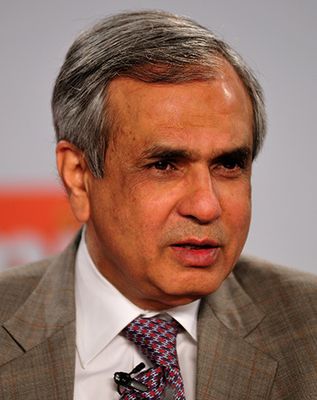 Rajiv Kumar | Getty Images
Rajiv Kumar | Getty Images
The NITI Aayog vice chairman designate comes with ideas that Indian middle class may like. “My mother who retired as college teacher gets barely 4 per cent on her pension that is deposited in the bank. Is this fair?” asked Dr Rajiv Kumar in a tweet on April 20. A few days earlier, he had described as the “craziest suggestion I must have heard in a long time” the government’s idea of fixing food portions in restaurants. “Let’s not take a legislative/admin view of everything,” he wrote.
Arvind Panagariya’s successor in the government’s think tank has straddled the corporate world, the academia and the civil society, and is all too familiar with Lutyens Delhi, its culture and its denizens’ way of working. This understanding should help him push work at NITI Aayog, which is mandated to throw up ideas, conduct pilot projects and evaluate them before implementation by the state governments as well as the Centre, and drive the transformation of India.
A senior fellow at the Centre for Policy Research, Delhi, Kumar is an unabashed Modi fan, but far from a blind one. He first met Modi in the winter of 2011, over a 90-minute interaction that the Gujarat chief minister had with a gathering of businessmen, and was impressed with Modi’s “sharp focus on economic development”. The first impression stayed, but many more impressions were formed because of Modi’s “quicksilver quality”. And it was to “examine, with an open mind, the strengths and weaknesses of the newly elected prime minister and his ability to seize the opportunities for taking India forward towards good times” that Kumar wrote the book Modi and His Challenges, in 2016.
And he has not gone gung-ho about anything major. But in talking about “one undeniable structural reform” by Modi, Kumar mentions the abolition of the Planning Commission and its replacing by NITI Aayog. Kumar believes that the focus of NITI Aayog will be on supporting and promoting cooperative federalism, and that it will infuse innovation into economic and technology policy formulation.
Kumar believes that for real economic growth, India cannot hope to rely on global economic growth. “This requires that Indian companies, suitably supported by focused government measures, achieve global competitiveness in selected sectors and strive to increase their market shares in a somnolent global economy.” The government and the corporate sector have to work in tandem for it, which he says is “not yet visible as the government remains overly cautious of being seen to be working with private industry.”
ADVICE TO MODI
* Modi (and Amit Shah) will have to rethink the extremely centralised and intrusive style of governance that characterised Gandhinagar.
* Modi cannot also hope to be in de-facto control of all imprortant ministries through the PMO. This will sooner rather than later result in a paralysis of decision making.
* Modi will have to restrain his ambitions for a global role until he has addressed the formidable and more urgent domestic agenda.
* Modi will also have to rethink his touching reliance on the existing or former bureaucrats. The “steel frame” has rusted to some extent.
* Modi will have to recognise that an India trapped in the morass of communal conflicts and ethnic violence could not possibly hope to achieve its economic and development goals.
* Operationalise and strengthen the Inter-State Council because state governments now handle nearly 80% of action required for improving business climate and raising welfare levels of people
* A second green revolution is badly needed.
(From Modi and His Challenges)






